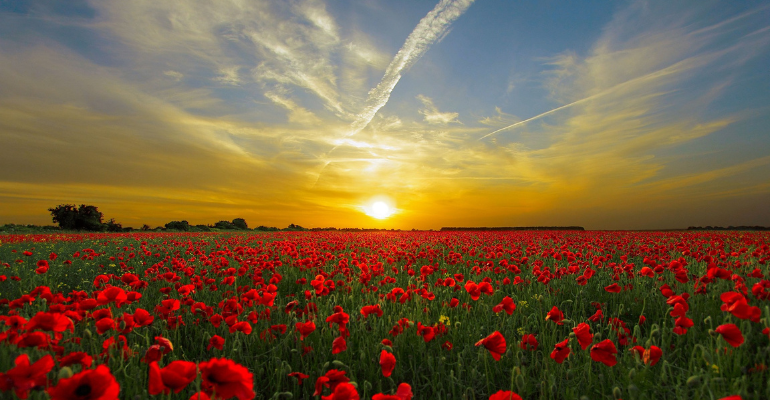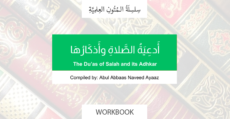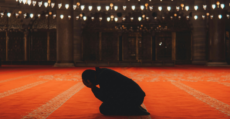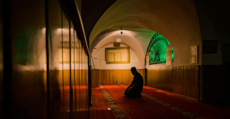In the name of Allāh, ar-Raḥmān (the most merciful), ar-Raḥīm (the bestower of mercy).
Reward vs struggle
The reward for an act of ‘ibādah is often based on the struggle and sacrifice a person must make to fulfil it. For this reason, there is great reward for ṣalāh, charity, hajj, jihād etc. These actions often involve sacrificing one’s time, wealth and desires; taking time out from work, or leaving ones family and land.
The general principle therefore is: the greater the struggle, the greater the reward.
However, there is an action that does not require any of the above. It contradicts the aforementioned principle. In fact, it does not even require much time, yet it is the most beloved and rewarding action to Allāh: Dhikr – the remembrance of Allāh.
Dhikr are words that are uttered, taking only seconds and minutes, and yet despite the lack of struggle, they carry immense reward.
The Prophet ﷺ asked his companions,
Shall I not inform you of the best action; the most purifying of actions with Allāh; the action that will raise you in rank the most? Better for you than even donating gold and silver in charity? [It is] the Dhikr of Allāh.[1]
Dhikr: The foundation of all ‘ibādāt.
Perhaps one of the reasons why dhikr contains so much reward is because it is the objective of every other act of worship. Why do we pray ṣalāh? Why do we fast and perform Ḥajj? Why does knowledge have such reward, and why was jihād legislated? To establish dhikr.
Thus every other ‘ibādah revolves around dhikr. Every other ‘ibādah is an avenue whilst dhikr is its objective.
The heart remains alive through dhikr
Just as a fish cannot live without water, and just as plants require rain and sunlight, similarly in the dhikr or Allāh, there is life for the heart – dhikr rectifies and awakens it. For this reason, the Prophet ﷺ said,
The example of a person who remembers Allāh and a person who does not remember him, is like the example of a person who is living and a person who is dead. [2]
When a person’s heart is alive, healthy, strong and pure, the rest of his body remains strong and pure. When the heart becomes stained and hard, his limbs become weak.
The Prophet ﷺ said,
In the body there is an organ; if it is healthy and good, the rest of the body is healthy and good. However if it becomes corrupt, the rest of the body is corrupted. Verily it is the heart. [3]
Just as metal rusts, the heart too can rust. And just as everything requires maintenance and shine, the heart is likewise in need of this.
Abu ad-Dardā said,
Everything has a shine and a polish; the polishing of the heart is in the dhikr of Allāh. [4]
Make dhikr in abundance
Whilst many other acts of ‘ibadah are restricted to certain times, there is no limit or time for making dhikr. The Prophet ﷺ would remember Allāh in all situations.[5] For this reason, purity from janābah (major impurity) is not a condition for making dhikr – as is required for reciting the Qur’ān; a person does not need to be in a state of wudū, nor is dhikr said in any particular position or state:
{Those who remember Allāh while standing, sitting and lying on their sides, and reflect on the creation of the heavens and the earth…} [03:191]
There is no limit for dhikr. We are not encouraged to merely say dhikr, rather we are encouraged to say it in abundance:
{O you who have believed, remember Allāh with much remembrance. And exalt him morning and afternoon. It is He who lavishes His blessings on you…} [33:41-43]
{…and men who remember Allāh in abundance, and women who do so – for them Allāh has prepared forgiveness and a great reward} [33:35]
Happiness lies in dhikr
As we age, life teaches us that true happiness is not found in worldly possessions, wealth, offspring, authority or fame. True happiness is achieved when a heart is content, the mind is tranquil, emotions are balanced, and when a person has guidance and direction. The source of all this is in dhikr.
{… those who believe and whose hearts find comfort in the remembrance of Allāh. Surely in the remembrance of Allāh do hearts find comfort} [13:28]
Therefore through dhikr, anxieties and worries are relieved and hearts are filled with joy and delight, for there is nothing more delightful, desirable, or sweeter for the heart than the love of one’s Creator, closeness to Him and in knowing him.[6]
Dhikr of the heart vs dhikr of the tongue
For dhikr to truly benefit a person, it must be more than mere words for ‘the best form of dhikr is when there is harmony between the heart and tongue. However, dhikr in the heart alone is more superior than dhikr of the tongue alone. This is because dhikr of the heart increases a person in his awareness [of Allāh], stirs within him love [of Allāh], develops modesty, awakens fear of disobedience, encourages self-discipline, prevents negligence and discourages heedlessness in committing sins.’ [7]
The best statements of dhikr
‘Subḥanallāh,’ ‘Alḥamdulillah,’ ‘Lā ilāha illa Allāh’ and ‘Allāhu akbar.’
These are the words most beloved to Allāh;[8] words more beloved to the Prophet ﷺ than anything upon which the sun has risen.[9] They are the best speech after the Qur’ān and they are also contained within the Qur’ān.[10] They cause sins to fall just as leaves fall off a tree.[11] They are seeds that are sown; their trees will be seen in Paradise.[12] They will be a salvation from punishment, a means of advancement in Paradise, and they are the acts of goodness for which the rewards remain.[13]
These few words of dhikr contain an immense reward due to their meanings.
- ‘Subḥanallāh’ is a glorification of Allāh, negating from him all weaknesses and deficiencies.
- ‘Alḥamdulillah’ is affirming perfection for Allāh; praising him out of love, exaltation and veneration.
- ‘Lā ilāha illa Allāh’ is the greatest statement a person can make. It affirms the tawḥīd of Allāh; Paradise was created for its people, and the Fire was created for those who oppose it.
- ‘Allāhu Akbar’ affirms the greatness of Allāh; there is nothing greater than him, nor more majestic than he is. He is above what people can ever estimate, he is too great than to be encompassed by the human mind.
Written by,
Abul Abbaas Naveed
6th Rabī’ ath-Thāni, 1446h,
Corresponding to 9th October 2024.
Footnotes
[1] Narrated by Mu’ādh Ibn Jabal. Collected by Ahmad.
[2] Narrated by Abū Mūsa al-Ash’ari. Collected by al-Bukhārī.
[3] Narrated by Nu’mān Ibn Bashīr; Collected by al-Bukhārī.
[4] Mentioned by al-Bayhaqi, in “Shu’ab al-Imān”, p503.
[5] Narrated by ‘Āishah; Collected by Muslim.
[6] Paraphrased from Tafsīr as-Sa’adi, sūrah 13 āyah 28.
[7] Paraphrased from Ibn al-Qayyim in “al-Wābil as-Ṣayyib”, p.85.
[8] Narrated by Samurah ibn Jundub; Collected by Muslim.
[9] Narrated by Abu Hurayrah; Collected by Muslim.
[10] Narrated by Samurah ibn Jundub; Collected by al-Bukhārī.
[11] Narrated by Anas Ibn Mālik; Collected by at-Tirmidhī.
[12] Narrated by Abu Hurayrah; Collected by Ibn Mājah.
[13] Narrated by Abu Hurayrah; Collected by an-Nasāī.





